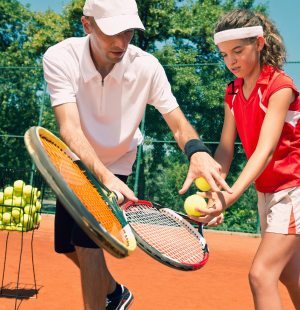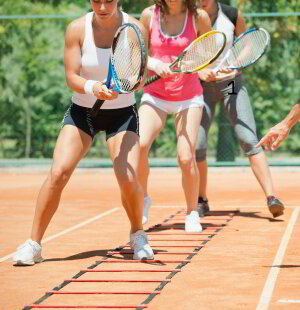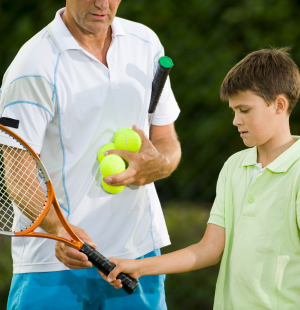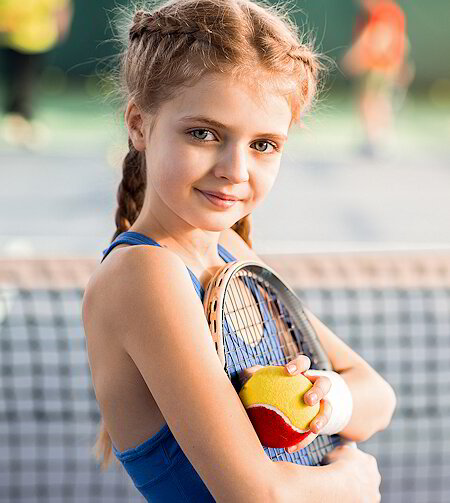
Why Development is More Important Than Winning
The Foundation Matters More Than the Finish Line


Think of early tennis years like building a house. If you rush to finish the roof without laying a strong foundation, everything eventually collapses. True champions are built slowly, step by step, not through a few quick wins at a young age.
Key Areas of Development That Outweigh Early Results
Technical Skills
🏸 Early focus should be on mastering correct technique—grips, footwork, various serves, swing mechanics—not just on what wins today. Poor technique might help a child scrape out a few early victories, but it becomes a massive barrier later when competition gets tougher.
Winning now with bad habits is short-term; building skills now leads to long-term success.
Physical Training
🏃♂️ Before specializing in advanced tactics or powerful shots, kids need to develop overall athletic abilities: balance, agility, coordination, and reaction time. These physical skills prepare them for any level of competition in the future—and for overall health.
Better movers make better players.
Strategic Thinking
🧠 It’s important that children start learning how to think about the game at a young age: choosing smart shots, anticipating opponents’ moves, and problem-solving on the fly. Winning through sheer power or speed alone won’t last; smart tennis players win for a lifetime.
Understanding the “why” behind every shot is more valuable than just hitting winners.
Emotional and Mental Growth
💬 Early competition should teach kids how to handle wins and losses, manage nerves, stay positive, and bounce back from mistakes. Mental muscles are as important as physical skills, and they are often the key difference between kids who stick with tennis and those who quit under pressure.
Losing gracefully now creates resilient champions later.


The Hidden Risks of an Early Win-At-All-Costs Mentality
🚫 When winning becomes the main goal too early, it often leads to:
- Fear of Losing: Kids become afraid to take risks and play creatively.
- Burnout: The pressure to win can drain the fun out of the game.
- Fixed Mindset: Children may believe that talent is fixed, rather than understanding that growth comes from effort and learning.
- Toxic Competitive Behavior: Early overemphasis on results can encourage poor sportsmanship and unhealthy attitudes toward opponents.
Parents can protect their child’s love for the game — and mental health — by focusing on growth, effort, and enjoyment over results.
👨👩👧 Practical Ways Parents Can Support Development Over Winning
- Praise Effort, Not Just Outcome: Instead of “Great job winning!” say, “I loved how hard you worked today!” or “You made some really smart choices out there!”
- Celebrate Improvements: Notice and acknowledge small technical or tactical improvements, even if the match was lost.
- Talk About Learning: After matches, ask, “What did you learn today?” instead of “Did you win?”
- Be Patient With Progress: Understand that improvement isn’t linear—there will be ups, downs, and plateaus.
- Model Healthy Attitudes: Stay positive and relaxed while watching matches. Avoid focusing only on results or criticizing mistakes.
🌟 Long-Term Benefits of a Development-First Approach
When parents and coaches emphasize development, kids are more likely to:
- Stay in the sport longer because they genuinely enjoy playing.
- Handle challenges better because they have strong emotional and mental skills.
- Reach higher performance levels later because they have the proper foundations.
- Develop life skills like resilience, problem-solving, and a growth mindset.
Tennis becomes more than just about winning matches—it becomes a lifelong passion and a powerful tool for personal growth.
🎯 Key Takeaway
In the early years of tennis, the real victory is in the development, not the scorecard. By prioritizing skill-building, physical growth, strategic understanding, and emotional strength, parents set the stage for their children to succeed far beyond junior tournaments. Remember: today’s small trophies mean little compared to a lifetime of achievement, confidence, and love for the game. Support your child’s journey with patience, encouragement, and a focus on progress over prizes — because in the long run, that’s what makes a true champion.
FAQs
✅ Q1: Should my child still play tournaments if we focus on development?
Yes! Tournaments offer valuable experience. Just make sure the focus stays on learning and giving their best effort and attitude, not just winning.
💖 Q2: What if my child gets upset about losing?
Help them reframe losses as opportunities to learn. Praise their effort and discuss what they did well and what they think they should work on to improve.
🧑🏫 Q3: How do I know if a coach is focusing too much on winning?
If practices emphasize only match results and quick fixes rather than long-term skill development, it might be time to discuss goals or explore other coaching options.
🚀 Q4: Can focusing on development still lead to competitive success later?
Absolutely. Players who develop strong technical, physical, mental, and strategic foundations thrive in higher-level competitions.
🔔 Q5: How can I stay positive if my child loses often early on?
Remember that early losses are normal. Focus on celebrating growth, resilience, and effort—you’re building the foundation for future success!


